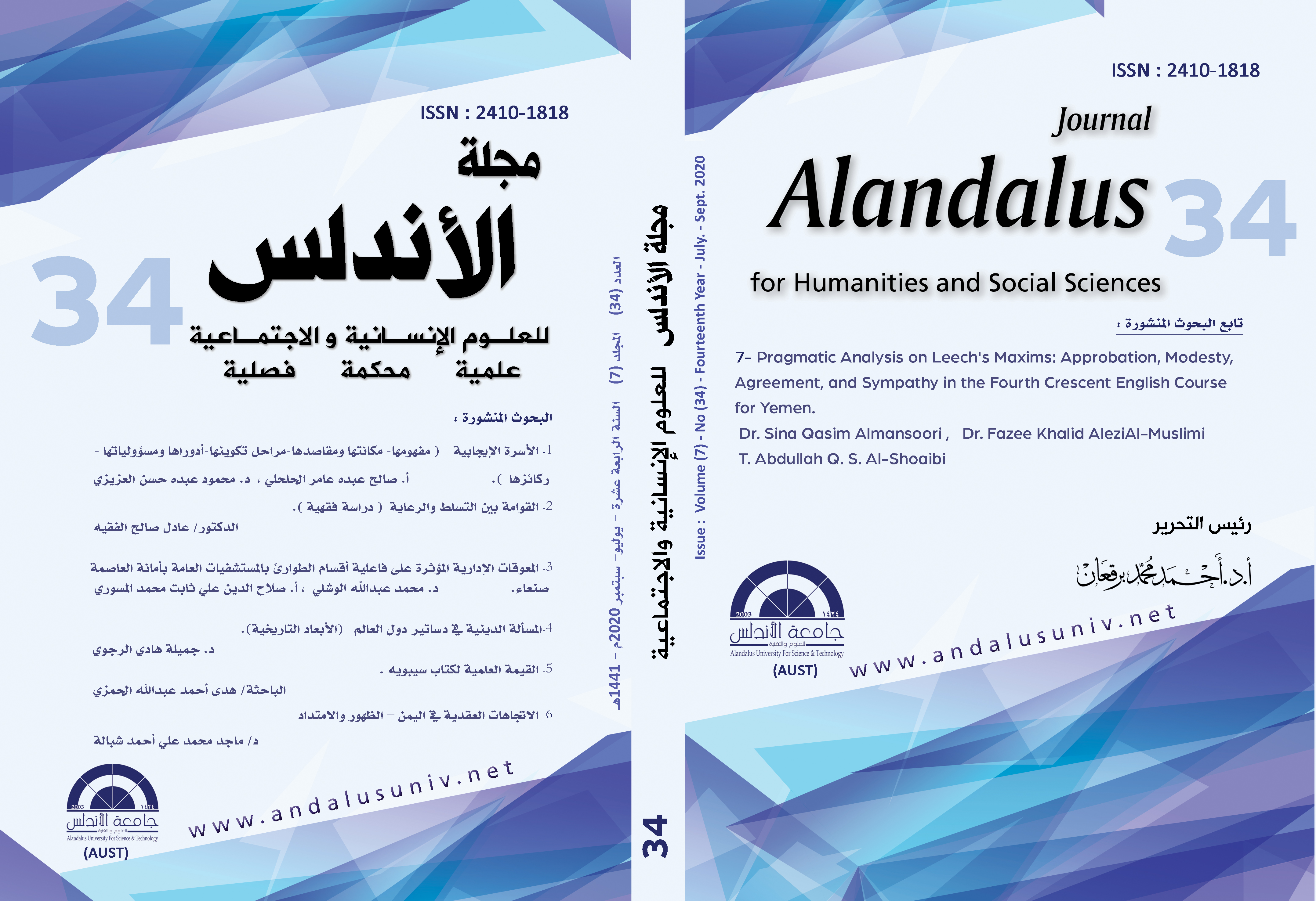Pragmatic Analysis on Leech's Maxims: Approbation, Modesty, Agreement, and Sympathy in the Fourth Crescent English Course for Yemen Dr. Sina Qasim Almansoori (1) Dr. Fazee Khalid AleziAl-Muslimi (2) T. Abdullah Q. S. Al-Shoaibi (3)
Main Article Content
Abstract
هدف الدراسة الحالية إلى اكتشاف التعبيرات المهذبة وغير المهذبة، الموجودة في كتاب (كريسنت 4) الخاص بمادة اللغة الإنجليزية للصف الأول الثانوي في مدارس التعليم الحكومية اليمنية، والمتعلقة بمبادئ الاستحسان، والتواضع، والاتفاق، والتعاطف لليتش (1983). كما هدفت إلى تفسيرها وكيفية حدوث انتهاكات لتلك المبادئ في سياق الكتاب المذكور. تعتبر الدراسة الحالية دراسة وصفية نوعية تحليلية، حيث تم جمع المعلومات من الأدبيات ذات الصلة والدراسات السابقة و كتاب اللغة الإنجليزية كريسنت 4. استخدم هذا البحث تحليل محتوى (الكتاب 4) كمصادر للبيانات. كشفت أهم نتائج هذا البحث أن مبدأ الاتفاق ومبدأ الاستحسان لمبدأ الأدب مستخدمان بشكل كبير، بينما مبدأ التواضع والتعاطف في الكتاب المدرسي مستخدم بشكل نادر. استخدمت في محادثات الكتاب 13 معطيات للاستحسان ، 4 بيانات للتواضع ، 20 للاتفاق و 4 للتعاطف. كما تم العثور على مخالفات الأقوال في واحدة من معطيات مبدأ الاستحسان، وفي 7 من أقوال الاتفاق، ولم يتم العثور على أيا من مخالفات الحياء والتعاطف.
الكلمات المفتاحية: التداولية ، أقوال ليتش ، التأدب كتاب كريسنت 4.
Article Details
References
References
Brown, P. (2015). Politeness and language. International Encyclopedia of the Social & Behavioral Sciences, 18(2), 326-330.
Budiarta, W. and Rajistha, G. (2018). Politeness in "Adit Dan SopoJarwo" animation. Lingua Cultura, 12(1), 25-30.
Crystal, D. (1985). A dictionary of linguistics and phonetics (2nded.). Oxford: Wiley-Blackwell.
Erlinawati, A. (2016). A pragmatic analysis of politeness principles on dispreferred second turns performed by the main characters in the movie The Duchess. Unpublished Master Thesis, UniversitasNegeri Yogyakarta.
Foley, W. (1997). Anthropological linguistics: An introduction. UK: Wiley-Blackwell.
Fraser, B. (1990). Perspectives on politeness. Journal of Pragmatics, 14(2), 219-236.
Handayani, T. (2013). Violating politeness principles in cellular phone provider. Lantern (Journal on English Language, Culture and Literature, 2(3), 1-10.
Holmes, J. (2001). An Introduction to Sociolinguistics. Edinburgh: Longman.
Ismet, M. (2014). AspekSopanSantunUjaranDalam Film Eat Pray Love karyaRyan Murphy. Unpublished Master Thesis, FakultasIlmuBudayaUniversitas Sam Ratulangi, Ratulangi.
Janson, T. (2012). The History of Language: An Introduction. Oxford: Oxford University Press.
Kawai, M. (2013). The application of politeness theory into English education in Japan. Unpublished Master Thesis, Linköping University.
Khorshidi, H. (2013). Politeness in study abroad. International Research Journal of Applied and Basic Sciences, 5 (3), 324-333.
Kingwell, M. (1993). Is it rational to be polite? Journal of Philosophy, 90 (8), 387–404.
Kurniasih, N. (2017). An analysis of politeness maxims found in Harry Potter movie based on Leech principle. Unpublished Master Thesis, the State Islamic Institute of Surakarta, Indonesia.
Lakoff, R. (1973). The logic of politeness; or, minding for p's and q's. Papers from the Ninth Annual Meeting of the Chicago Linguistics Society, 292-305. Chicago: Chicago Linguistic Society.
Leech, G. (1983).Principles of pragmatics. New York: Longman.
Lestari, D. P. (2014). An analysis of politeness language patterns in request used in the English textbooks of second grade of Junior High school. Unpublished Master Thesis, Faculty of Teacher Training and Education, University of Bengkulu, Indonesia.
Lestari, P. (2013). A pragmatic analysis of Leech's maxim found in the princess and the frog movie script. Unpublished Article, Muhammadiyah University of Surakarta.
Levinson, S. (1987). Pragmatics. Cambridge: Cambridge University Press.
Meier, A. (1995). Defining politeness: Universality in appropriateness. Language Sciences, 17, 345-365.
Morris, C. (1937). Logical positivism, pragmatism, and Scientific empiricism. Paris: Hermann.
Muhaiminah, H. )2013). The violations of politeness principle in humorscenes of lovely complex comic series. Unpublished Paper. Islamic StateUniversitySunanKalijaga, Yogyakarta.
Noviani, Q. (2014). A pragmatic analysis of politeness strategies and politeness principles in Uptown girls. Unpublished Master Thesis, Yogyakarta State University.
Nurdianingsih, E. (2006). An analysis of tact and approbation maxims based on Leech’s politeness principles in the movie “Maid in Manhattan” (a pragmatics study). Unpublished MasterThesis, SebelasMaret University, Surakarta.
Prihatini, Y. 2006. An analysis of the violations of politeness principle usedin English conversation in Donald Duck Comic. Unpublished Paper, Muhammadiyah University, Surakarta.
Rashid, B. N., and Hattab, H. A. (2016), Theoretical study of the politeness principle and its effects on literary discourse. Special issue of the international scientific conference at the University of Baghdad /College of Education,Al-Ustath, 1, 101-110.
Said, N. (2011). Politeness strategies in requests: The case of Elfhoul speech community. Unpublished Master Thesis, AboubakrBelkaid University,Tlemcen.
Sandra, A. (2010). A politeness maxim analysis on the dialogue of datenight movie. Unpublished Master Thesis, State Islamic University Syarif, Jakarta.
Saputri, R.)2017). The violation of politeness principles in Monster University Movie. UnpublishedPaper, Islamic StateUniversity SunanKalijaga, Yogyakarta.
Scarcella, R. and Brunk, J. (1981). On speaking politely in a second language. In J. Walters and J. Fishman (Eds). The sociolinguistics of deference and politeness. London: Mouton Publishers.
Sifianou, M. (2000). Politeness phenomena in England and Greece: A cross-cultural perspective. Oxford: Clarendon Press.
Yule, G. (1996). Pragmatics. Oxford: Oxford University Press.

